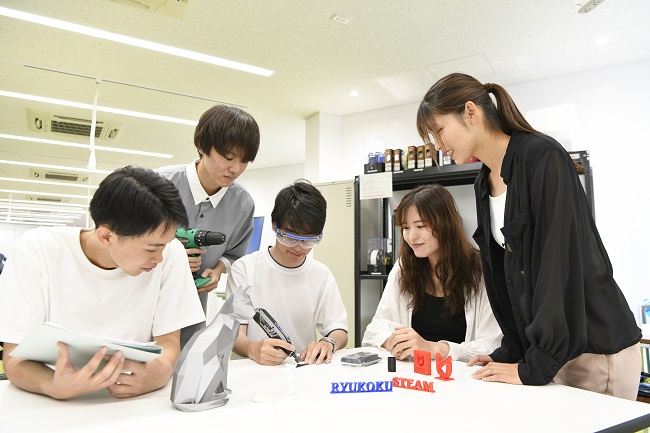In 2020, the Faculty of Advanced Science and Engineering, which was reorganized from the Faculty of Science and Engineering, has a vision of "Society 5.0," a society in which everything is connected digitally. Based on the argument that it is necessary to develop a horizontal axis of “doing”, we introduced a “curriculum system” for the first time in science and engineering departments in Japan.This has enabled cross-disciplinary learning that incorporates programs from other courses, and has laid the groundwork for nurturing science and technology human resources who take on the challenge of solving social issues with a broad perspective while honing their expertise.
In addition, we have adopted a quarter system in which one year is divided into four semesters, and for about three months including the second quarter of the third year and summer vacation, students can study independently without setting compulsory subjects "R-Gap ( Ryukoku Gap Quarter)" is set up, and through a wide range of programs such as survey/research activities, internships, and overseas activities, students develop independence and proactiveness in learning.

R-Gap period in which students learn independently without setting compulsory subjects
During the R-Gap period, students can freely design their activities, including three programs: "Project Research," "Science and Engineering Internship," and "Global Human Resource Development Program."Volunteer activities and, of course, regular classes are also possible.
In the "Project Research" program, students conduct surveys and research activities based on their own ideas. Individuals or small groups set challenges, conduct surveys and research activities, and present results.
In addition, students can take advantage of what they have learned at the School of Advanced Science and Engineering by going to public institutions and companies for short-term practical work experience, which will be useful for their future careers. There are three "global human resource development programs" in which students gain work experience at local companies, understand the technological capabilities that support the industry, and experience English conversation practice, report writing, and presentations of learning results through the program.
All of them are characterized by arousing the independence of students and promoting initiatives as part of learning that will lead to the future.If you report the purpose and results of your activities in accordance with the prescribed procedures, credits will be recognized in the same way as regular subjects.
Understanding was deepened by having a specific purpose of participating in the RoboCup
Mr. Shohei Yasuda, a fourth-year student in the electronics, information and communication course, worked on "Practice of Reinforcement Learning (participation in RoboCup)" as "project research" during the R-Gap period.He said that he originally liked robots, but he became interested in reinforcement learning after watching a video site. “I thought it would be interesting to see the robot, which initially moved awkwardly, become able to move naturally as if it were really alive through reinforcement learning,” says Mr. Yasuda.Reinforcement learning is a technique that enables computers to perform tasks by repeating trial and error in a dynamic environment.
“At the R-Gap preliminary consultation meeting, I learned that there was a professor at the Faculty of Advanced Science and Engineering who was researching reinforcement learning, so I went to talk to him with my friends. I decided to take on the challenge after receiving a suggestion to participate in the RoboCup Japan Open 2022, where teams aiming to compete in the RoboCup World Championship gather to test the results of my studies.”
First of all, we started studying ROS (Robot Operating System) that controls robots and reinforcement learning, completed the challenges of RoboCup on a simulator, implemented a reinforcement learning program, and made a plan to participate in the competition after final adjustments. .
“Unexpected troubles occurred before the participation, and there were difficulties in dividing roles between members, but I was able to work on reinforcement learning and ROS with the goal of participating in the RoboCup. I think that's why I was able to gain a deeper understanding," says Yasuda.She continues to study at the laboratory of Associate Professor Wataru Uemura, who was instructed by this initiative in R-Gap's "Project Research", and plans to work on robot research at graduate school in the future. she says.
- 1
- 2

